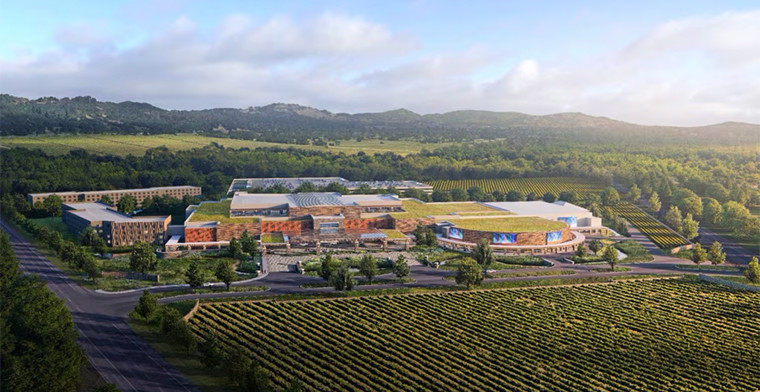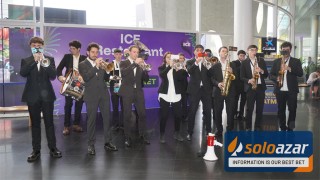Proposed tribal casino is risky business and sparks tensions in California
Wednesday 27 de November 2024 / 12:00
2 minutos de lectura
(Washington).- The Koi Nation, a small Native American tribe with fewer than 100 members, is moving closer to building a $600 million Las Vegas-style casino resort in California’s Sonoma County, just an hour north of San Francisco.

The Bureau of Indian Affairs has released its final environmental impact statement for the proposed Shiloh Resort and Casino, marking a key step in the tribe's application to place 27 hectares of land into federal trust.
The environmental report analyzed the project's potential impacts on air and water quality, wildlife, traffic, and other factors. While most effects were deemed "less than significant," some were classified as "potentially significant." The public now has 30 days to review the findings and submit comments before the bureau makes a final decision.
The Shiloh project faces stiff opposition from California lawmakers, Governor Gavin Newsom and neighboring tribes. Newsom argued in an August letter to the Department of the Interior that the land in question lies outside the Koi Nation’s historical homeland — a key requirement under federal law for gaming approval.
Competing tribes, most notably the Federated Indians of Graton Rancheria, also oppose the project. They launched a high-profile media campaign earlier this month with full-page ads in major newspapers accusing the Interior Department of undermining tribal sovereignty.
At the heart of the controversy is the Indian Gaming Regulatory Act of 1988, which sets the rules for tribal gaming and includes guidelines about a tribe’s historical connection to land. The casino must be located on land the federal government holds in trust for the tribe. The act also prohibited gaming on lands acquired after October 17, 1988, unless certain conditions are met.
One such exception applies to tribes with restored federal recognition. In December 2023, the Biden administration announced an updated final rule that made it easier for tribes to acquire land in trust. The rule now permits gaming on lands placed into trust as part of restoring territory to a landless tribe that has regained federal recognition.
To qualify for this exception, a tribe must demonstrate both a historical and contemporary connection to the land.
For the Koi Nation, the fight is deeply personal. In 1916, the federal government recognized the tribe under its former name, the Lower Lake Rancheria, and allocated 56 hectares of land in neighboring Lake County which were largely unfarmable. By 1918, most tribal members had relocated to Sonoma County.
In 1956, the federal government sold off 40 hectares of the Lake County land and transferred the remaining 16 hectares to the sole tribal member still residing there.
The Interior Department did not officially terminate the tribe; through clerical errors, it simply forgot about them. Decades later, the government reaffirmed that relationship.
“The Lower Lake Rancheria have been officially overlooked for many years by the Bureau of Indian Affairs even though their government-to-government relationship with the United States was never terminated,” then-assistant Indian affairs secretary Kevin Gover stated in his December 29, 2000 finding. “I am pleased to correct this egregious oversight.”
The Koi purchased the Shiloh land for $12.3 million in 2021 and applied to the government to place the land into trust. The tribe says that trails their ancestors used in trade pass directly through the site.
“The Koi Nation has been in this region for thousands of years and is fully within its rights to pursue this project,” said Sam Singer, a spokesperson for the tribe.
Singer attributes much of the opposition to fear of competition. Currently, more than 60 tribes operate 66 casinos across California. The Graton Rancheria operates a resort and casino about 17 kilometers south of the Shiloh property and is currently undergoing a $1 billion expansion.
By Cecily Hilleary
Categoría:Casino
Tags: Sin tags
País: United States
Región: North America
Event
ICE Barcelona 2026
19 de January 2026
Merkur Group Shines in Barcelona with Triple ICE Triumph
(Espelkamp/Barcelona).- Merkur Group secures three prestigious international accolades for operational excellence, social commitment, and standout exhibition experience.
Friday 06 Feb 2026 / 12:00
Eduardo Aching: "ICE 2026 was an exceptional event for Konami and its casino partners"
(Barcelona, SoloAzar Exclusive).- Eduardo Aching, Vice President of iGaming & International Gaming Operations at Konami Gaming, reflects on the company’s standout participation at ICE 2026, the strong reception to Solstice 49C and Konami Online Interactive, and the strategic push toward emerging regulated markets and expanded global partnerships.
Friday 06 Feb 2026 / 12:00
Belatra Games Strengthens LatAm Expansion and Innovation Strategy After ICE Barcelona 2026
(Barcelona, SoloAzar Exclusive).- Kateryna Goi, Chief Marketing Officer at Belatra Games, shares her assessment of the company’s participation in ICE Barcelona 2026, the quality of industry engagement at the event, and the strategic priorities shaping Belatra’s growth in 2026, with a strong focus on Latin America and narrative-driven innovation.
Friday 06 Feb 2026 / 12:00
SUSCRIBIRSE
Para suscribirse a nuestro newsletter, complete sus datos
Reciba todo el contenido más reciente en su correo electrónico varias veces al mes.



















